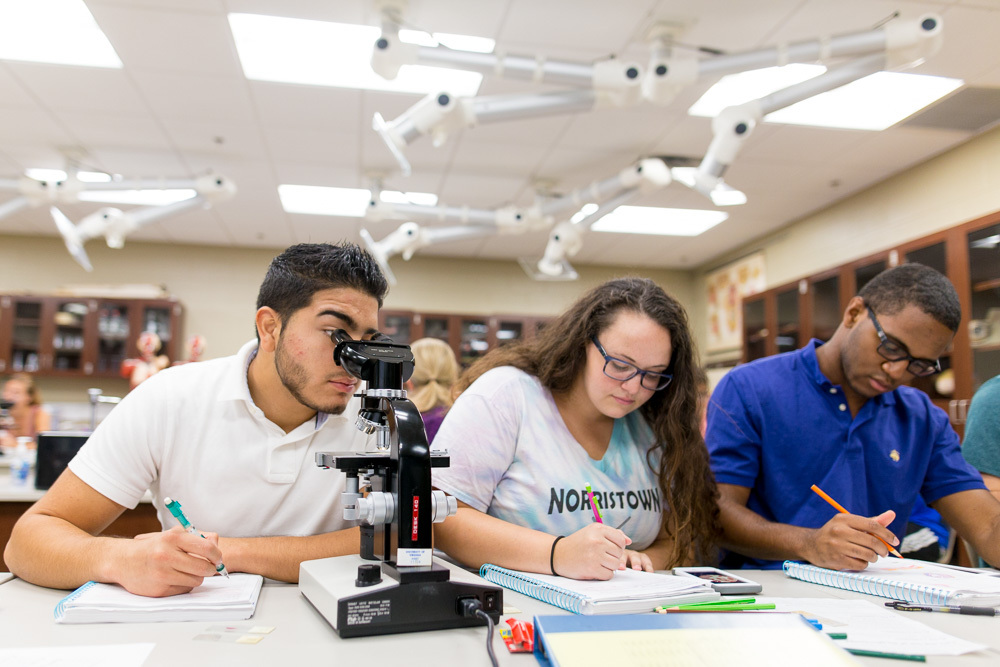An innovative new program at Eastern Mennonite University will provide scholarships for academically talented students with financial need studying in the fields of science, technology, engineering and math (STEM).
The $600,000 grant from the National Science Foundation funds 14 scholarships as well as other support services for students, including peer tutoring, attendance at conferences, and stipends for student clubs.
Scholarship awardees will join a cohort within the STEM Scholars Engaging in Local Problems (SSELP) program, focused on socially-engaged learning.
“Here at EMU, our STEM students make real-world, local impacts while gaining skills and knowledge that will prepare them for the professional field or for graduate school,” said Professor Tara Kishbaugh, who chairs the biology and chemistry departments and led the faculty committee that wrote the grant. “The SSELP program builds on this legacy and opens new doors for our students.”
View WHSV’s coverage.
Who can apply?
U.S. citizens, U.S. nationals or permanent residents intending to study in the following majors are eligible to apply: biology, chemistry, biochemistry, environmental sustainability, math, computer science and engineering.
Seven scholarships — three worth $10,000 a year and four of $5,000 a year — will be awarded to deserving students matriculating in the fall of 2018. The deadline to apply is Feb. 2, 2018.
An additional seven scholarships will be awarded in the fall of 2019.
Selection is based on academic performance, SAT/ACT scores, an essay, a personal interview and a letter of recommendation from a science or mathematics teacher. Students must be eligible for need-based federal financial aid, as defined by the U.S. Department of Education.
“We are looking for high-achieving students who are motivated and committed to the SSELP program, and really excited to explore options in the STEM majors,” said Matt Ruth, director of admissions. “This is a special opportunity to be involved in a ground-breaking program at EMU and we expect to see some excellent applicants from schools both near and far.”
What is SSELP?

Career exploration and networking begin during the first year at EMU, with a cohort-based practicum that invites area STEM professionals into the classroom to talk about their work. Local and regional issues in the Shenandoah Valley will also be explored.
SSELP scholars will experience “early and consistent exposure to inquiry- and problem-based learning through research projects focused on real-world issues,” Kishbaugh said. “We’ve also built in projects that ask students to work collaboratively across different scientific disciplines, an important skill for graduate school or employment in STEM fields.”
Employing their skills in “practical ways that yield tangible results” helps students see their impact on the community and the world, she added.
“Attracting and retaining a diverse range of students to the STEM fields benefits us all, both here at EMU and in the broader world,” Kishbaugh said. “When our scientists more accurately represent humanity, the potential for scientific breakthroughs and for addressing major problems of today and the future broadens in major ways.”
Mentorship, field trips, attendance at conferences, and access to a peer tutoring program are also components of the program.
The program builds on a 2016 National Science Foundation research grant awarded to EMU to improve instructional techniques and retention among minority and first-generation college students in the STEM fields. Thirteen professors across several disciplines have been involved in learning and testing new pedagogies.
The SSELP program is a “natural extension of this work,” Kishbaugh said. “We’re equipped in many ways to help more students succeed and that’s really exciting to us as teachers and scientists.”

I am a STEM advocate and alumnus of EMU. Congrats on receiving this important grant. I’m currently working at a science museum in Lancaster. If there is anything I can do to assist with this grant, please let me know. I’m a huge fan of both EMU and STEM education.